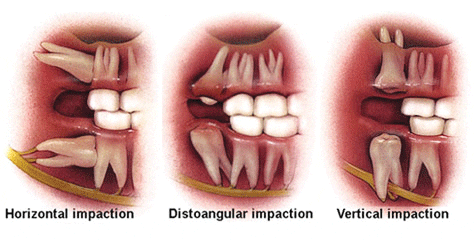So, why do so many patients need their wisdom teeth removed? The simplest answer is that wisdom teeth have the potential to create a number of oral health issues in the future. Some of them become issues as soon as the wisdom teeth erupt from the gums, but others are high-risk future problems that could develop if the wisdom teeth are left to grow on their own.
The most common issues related to wisdom teeth are:
- Impacted teeth: For some reason, although humans have developed a third set of molars called the wisdom teeth, the jawbone didn’t develop to adapt to the change. A lot of the time, a patient’s jawbone might not be large enough to allow the wisdom teeth through. As a result, when the teeth do begin to grow in where there’s not enough space, they become impacted. Impacted teeth can be very painful and can have repercussions throughout the mouth, extracting the wisdom teeth early on prevents these side effects.
- Crooked teeth: Like ordinary teeth, wisdom teeth can also grow in crooked, sideways, or otherwise misaligned. Because of space issues, it might not always be possible to fix the alignment via orthodontia. In situations like these, wisdom teeth removal could be easier than to go through the trouble of maintaining the teeth.
- Infection: Sometimes, the wisdom teeth don’t erupt from the gums completely. This might not sound too bad, but when the wisdom teeth only grow in halfway, the resulting “flap” of gum tissue can trap all sorts of food and germs that can circulate through the mouth. Because it can be hard to reach areas like these with your toothbrush, infection can easily develop, causing much more serious problems that will require more expensive and extensive dental treatment.
- Accessibility issues: Wisdom teeth can develop cavities and gum disease just like every other tooth in the mouth, but, unlike the other teeth, they aren’t as easily accessible to a dentist. Because of how deep in the mouth the third molars are, it’s not always easy or even feasible for a dentist to reach all the way in to clean and maintain the teeth. If you are particularly vulnerable to cavities or gum disease, your dentist may recommend wisdom teeth removal just to prevent future struggles with taking care of them.
As you can probably tell, the majority of dental patients fall under one of the at-risk categories listed above, which is why so many people get wisdom teeth extractions done as soon as the teeth are ready, sometimes as early as age 16.

What are the benefits of having my wisdom teeth removed by Mint Dental Anchorage
Wisdom teeth, also known as third molars, typically emerge between the ages of 17 and 25. For many individuals, these teeth can cause various dental issues, making wisdom teeth removal a common dental procedure. Here are several compelling reasons why you should consider having your wisdom teeth removed:
1. Preventing Crowding and Misalignment: Wisdom teeth often lack the space they need to erupt properly. As they emerge, they can push against the adjacent teeth, causing crowding and misalignment. This can lead to shifting of your existing teeth, potentially undoing years of orthodontic work. Removing these teeth can help maintain the alignment of your smile.
2. Reducing Pain and Discomfort: Wisdom teeth can frequently cause pain and discomfort. They may only partially erupt, which can create an opening for bacteria to enter, resulting in infection and gum inflammation. Full eruption can also be painful due to the pressure on your gums and neighboring teeth. Removal can alleviate this discomfort.
3. Preventing Cysts and Tumors: In some cases, wisdom teeth may become impacted, meaning they don’t fully emerge from the gums. This can lead to the formation of cysts or tumors around the impacted teeth, which may damage the surrounding bone and teeth. Removing the wisdom teeth can prevent these serious complications.
4. Maintaining Oral Hygiene: Due to their location at the back of the mouth, wisdom teeth can be challenging to clean properly. This can result in an increased risk of tooth decay and gum disease. Removing them can make it easier to maintain good oral hygiene and prevent dental issues.
5. Eliminating Chronic Infections: Wisdom teeth that are partially erupted are more susceptible to infections. These chronic infections can lead to bad breath, pain, and overall discomfort. Removal can help eliminate these recurring problems.
6. Peace of Mind: Regular dental check-ups can monitor the development of your wisdom teeth and detect potential issues. Having them removed when recommended can provide peace of mind, knowing that you are proactively preventing potential dental problems.
Ultimately, the decision to have your wisdom teeth removed should be made in consultation with your dentist or oral surgeon, who can assess your specific situation. While not everyone needs to have their wisdom teeth removed, considering the potential benefits in terms of oral health and comfort is essential in making an informed decision about your dental care.







